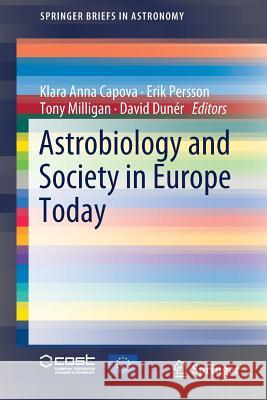Astrobiology and Society in Europe Today » książka



Astrobiology and Society in Europe Today
ISBN-13: 9783319962641 / Angielski / Miękka / 2018 / 72 str.
Astrobiology and Society in Europe Today
ISBN-13: 9783319962641 / Angielski / Miękka / 2018 / 72 str.
(netto: 191,66 VAT: 5%)
Najniższa cena z 30 dni: 192,74
ok. 16-18 dni roboczych.
Darmowa dostawa!
Executive Summary 5
Acknowledgements 6
Abbreviations 7
Affiliations 8
1. Astrobiology and Society in Europe 9
1.1 Introduction 9
1.2 The Contribution of Humanities and Social Sciences to EU Astrobiology 9
1.3 What is Astrobiology? 10
1.4 Organising EU Astrobiology Research 11
2. The International Context of Astrobiology 12
2.1 Introduction 12
2.2 European Astrobiology Research to Date 13
2.3 American Experience 15
2.4 International Outlook 16
2.4.1 Africa 16
2.4.2 Asia 16
2.4.3 Latin America 17
2.5 Current Regulations and Planetary Protection 18
3. Society, Worldview and Outreach 20
3.1 Introduction 20
3.2 The Public Understanding of Astrobiology 20
3.3 Popularisation, Dissemination and Outreach 21
3.4 Rethinking Humanity’s Place in the Universe 23
3.5 Astrobiology and Religion 24
4. Environment and Sustainability 26
4.1 Introduction 26
4.2 Environmental Protection and Sustainability 26
4.3 Earth Sites of Importance for Astrobiology 27
4.4 Environmental Ethics in Space 28
5. Education, Training and Scholarship 30
5.1 Introduction 30
5.2 Astrobiology Training and Education 30
5.3 Astrobiology and Society in European Scholarship 31
5.4 Science and Technology Awareness among Students 33
6. Technological Innovation and Commerce 35
6.1 Introduction 35
6.2 Technological Innovations Driven by Astrobiology 35
6.3 Potential Conflicts of Interest 36
7. Science and Research 38
7.1 Introduction 38
7.2 Advancing Astrobiology Research in Europe 38
7.3 Careers in Astrobiology 40
7.4 The Social Study of Astrobiology as a Science 42
8. Leading the Future of Astrobiology in Europe 44
8.1 Introduction 44
8.2 Challenges Facing the EU Astrobiology Community 44
8.3 The Role of the European Astrobiology Institute 45
8.3.1 Principal Tasks 46
8.3.2 Research Areas 47
8.3.3 Funding and Mentorship 48
8.3.4 Suggested Activities of the EAI 49
8.3.5 Multidisciplinarity and Networking 49
9. Appendices 51
9.1 Definitions 51
9.2 Presentation of the Group 52
9.3 COST Action Memorandum 52
9.4 Suggested Literature 53
Dr Klara Anna Capova is an anthropologist working in science and technology studies, specialising in the social study of astrobiology and anthropology of outer space. In 2013, she completed her doctoral research on scientific search for life beyond earth, Durham University, UK. Her recent work includes the study of transformations of human relations to outer space, popular perceptions of science, and societal context of space exploration. Dr Capova is currently a honorary research associate at Durham University, UK. Klara is a member of the WG5 on Philosophy and History of Science, of the COST Action TD1308 ORIGINS and evolution of life on Earth and in the Universe; a member of the European Astrobiology Network Association, Astrobiology Society of Britain and a member of the Scientific Organizing Committee of the International Working Group on Astrobioethics. She is active in delivering talks worldwide as well as acts as an associate researcher and project consultant in societal aspects of space and society, and science and technology.
David Dunér is professor of history of science and ideas at Lund University, Sweden. He is also a researcher at the division for cognitive semiotics at Lund University. He was the leader of working group 5 on the history and philosophy of astrobiology within the COST Action TD 1308, Origins and Evolution of Life on Earth and in the Universe. He has edited the book The History and Philosophy of Astrobiology: Perspectives on Extraterrestrial Life and the Human Mind (Cambridge Scholars: Newcastle-upon-Tyne, 2013) and special issues on the history and philosophy of astrobiology in Astrobiology (2012), and on the history and philosophy of the origin of life in International Journal of Astrobiology (2016).
This White Paper describes the state of astrobiology in Europe today and its relation to the European society at large. With contributions from authors in twenty countries and over thirty scientific institutions worldwide, the document illustrates the societal implications of astrobiology and the positive contribution that astrobiology can make to European society.
1997-2026 DolnySlask.com Agencja Internetowa
KrainaKsiazek.PL - Księgarnia Internetowa









